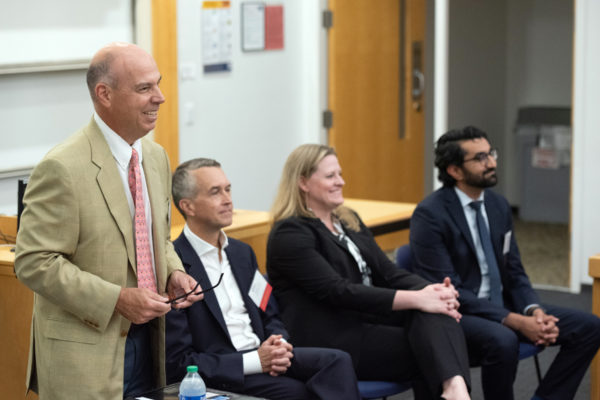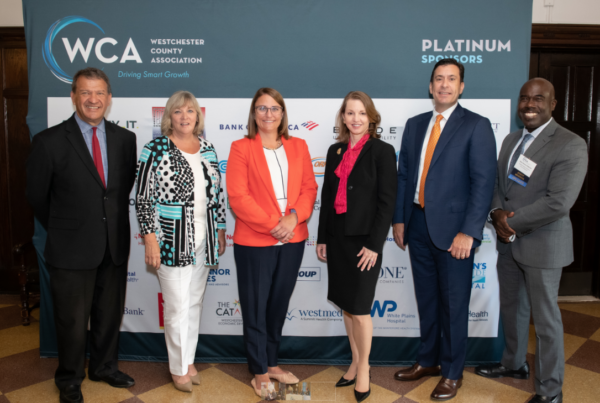The Harvard Business School defines sustainability in business as doing business without negatively impacting the environment, community or society as a whole. For the Westchester County Association (WCA), sustainability no longer is something its members can afford to keep off their radar screens and deal with only when unavoidable. “Sustainability is now a necessity for well-run organizations,” WCA said in announcing its recent WCA Sustainable Business Conference that was held at the Elisabeth Haub School of Law at Pace University in White Plains.
Business executives from organizations including Bank of America, JPMorgan Chase, Dandelion Energy, Con Edison, Nestle, PKF O”™Connor Davies and Clearstream Capital participated with representatives of government and agencies such as the New York Power Authority and the New York State Energy Research and Development Authority (NYSERDA) in presentations and discussions of various sustainability subjects before an estimated 150 attendees.

Omer Farooq, managing director, global sustainable finance, Bank of America.
Andrew Ward, founder and managing partner of Clearstream Capital, noted, “Sustainability means different things to everyone, people and businesses. We all have to figure out how to decarbonize and reduce our (carbon) footprint. Natural gas will be with us for a very long time. We can”™t switch to all-electric overnight. We need pathways to decarbonization.”
Doreen Harris, president and CEO of NYSERDA, in her keynote address to the conference”™s plenary session, said, “It”™s big changes that we are talking about. What you are each doing at the local level is hugely important. Looking at the investments being made in Westchester County is indicative of the commitment and spread we need to see in New York. To reach these economies of scale, we do it through meetings like this.”
Shannon Smith, chief growth officer at Dandelion Energy, which specializes in geothermal heating and air conditioning installations, reported, “Our main competition at Dandelion is consumers”™ inertia. People are already stressed and overwhelmed in their day-to-day lives, and this becomes just one more thing to explore. It”™s easier to stay with what they know.”
Molly Dee-Ramasamy, director of deep carbon reduction for the mechanical and electrical consulting engineering firm Jaros, Baum & Bolles, said, “We”™re very involved in the electrification of some of the most iconic buildings in New York state and it is possible to achieve carbon reduction. There”™s reason to be positive.”
Michael Romita, president and CEO of the WCA, told the Business Journals, “Sustainability and sustainability management are probably the most important talked-about concepts in business strategy right now. We need to introduce these concepts to the regional business community in an organized and programmatic fashion.”

Romita said that having WCA host the first-ever business sustainability conference in the area is a step in creating familiarity with those concepts.
“There are big changes coming to our regional businesses as a result of New York”™s climate laws. These are going to have a profound impact on day-to-day business operations, on transportation, on housing, on business development and more,” Romita said. “Our businesses need to learn how to adapt and respond to these challenges or they are going to get left behind. In addition to that, if you look at what”™s happening at the federal level, there is an inability to take action. We haven”™t had a federal energy policy probably in a couple of generations, so these issues are going to fall more and more to the states and the local level and onto the private sector. We need to learn how to adapt and evolve as a business community.”
Romita said that WCA has multiple sustainability efforts underway such as providing targeted advocacy, creating training tools, hosting a clean-energy portal, developing possible grant opportunities and presenting conferences such as the one held on July 14 at Pace.
“One of the takeaways from the conference is that even though sustainability has been around for a while, there still is some confusion as to how to define the issue and what it represents,” Romita said. “We need to bring some conceptual clarity to the issue and avoid ”˜greenwashing,”™ false labels and irrelevant distractions. The only way to do that is to be finite, specific and to use measurable datapoints to make progress.”
Romita said that businesses need to be aware of more than just what”™s been appearing on the news with record temperatures being reported, wildfires raging out of control and high-intensity storms. He said that if a business is trying to get a new real estate development approved now in Westchester County, questions likely will be raised about flood mitigation, whether energy-efficient appliances and building materials will be used and whether the building will be dependent on fossil fuels.
“I”™d say probably 90% of the energy used in downstate New York is still created from traditional fossil fuels but if you look at upstate New York it has actually flipped where 90% of electricity is actually carbon-free; it comes primarily from nuclear and hydro,” Romita said. “New buildings are going to have to start being built by using electric only and existing buildings and assets are going to have to convert from the use of traditional fossil fuels to electricity. That”™s going to be incredibly expensive.”

Romita, who moderated two of the panels during the conference, observed that they were contentious by design.
“What we didn”™t want to do was host yet another conference where all of the panels were in complete agreement. We wanted to foster constructive dialogue. It”™s okay for people to disagree; that”™s how you make progress,” Romita said.
Romita said that based upon the feedback they”™ve been getting, sustainability is a subject that will regularly be covered by the WCA. It”™s an area with which he”™s familiar because his background includes having managed an energy company and practicing environmental and energy law.
“The WCA has been pretty proactive about identifying this as one of the primary pillars of growing the regional economy. Now with New York state taking aggressive action, businesses need to understand how to make these concepts work for them,” Romita said. “Wind and solar are going to be a big piece of this. Hydro is going to be a big piece of this. Energy storage is going to be a big piece of this. Think of it as business strategy viewed through the lens of environmentalism and corporate responsibility.”





















